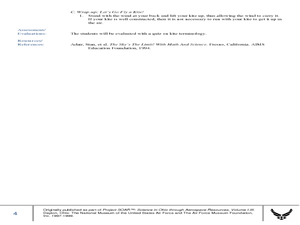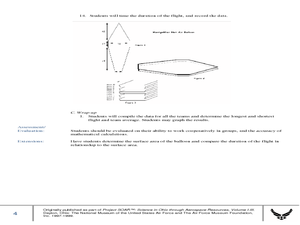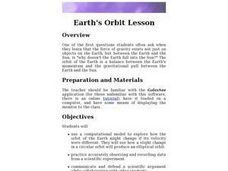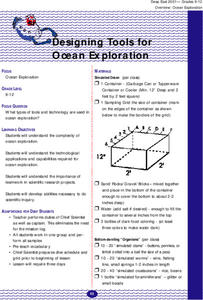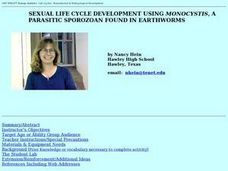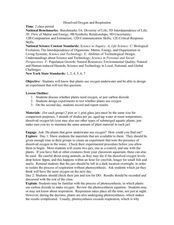Curated OER
The Button Box
Students classify buttons. In this classification instructional activity, students listen to the book The Button Box by Margarette S. Reid before observing, describing and classifying real buttons.
Curated OER
Sorting Buttons
Students study sorting. In this classification lesson, students sort buttons into groups based on a common characteristic and draw two pictures illustrating the different groups.
Curated OER
Yeast Cells and Their Environment
Middle schoolers create their own experiment in which they have yeast cells growing in liquid environments. They examine the relationship between humans and microorganisms. They also practice using the scientific method.
Curated OER
Fun with Balloons
Fifth graders design their own hot air balloon. In this science lesson, 5th graders investigate how factors like weight and sizes affect a balloon's lifting power. They also write math problems based on facts written in the book "The...
Curated OER
The Paper Dutch Kite
Students construct a Dutch Kite using simple materials. In this math lesson plan, students measure kite dimensions according to specified instructions. They also describe and define the different parts of a kite.
Curated OER
Rock Identification Lab
Eighth graders compare and contrast the three different types of rock. In this earth science lesson, 8th graders classify rock samples according to their correct rock type. They design their own data collection table.
Curated OER
How Can You Study Things You Can’t See Like: Atoms?
Learners simulate how scientists studied things they can't see like atoms. In this chemistry lesson, students predict what is inside the numbered obsertainers. They design a way to investigate what's inside without opening it.
Curated OER
Tee Off!
Students explore about one of the many products created by gain-based process. They investigate the ways agriculture can protect and preserve the environment. Pupils use their scientific processing skills to conduct a full inquiry based...
Curated OER
Using Science Skills to Investigate Japanese Quail
Sixth graders explore Japanese Quail. They generate and record scientific questions about the quail. Students gather information from various sources and record their data. They compose an inquiry report and include it in a portfolio.
Curated OER
Testing the Hypothesis
Students create and conduct various experiments to determine the origin of a family artifact, and then determine whether their results were successful. Students summarize their results and evaluate whether their hypotheses were correct.
Curated OER
Let's Grow Some Microbes!
Students investigate the effect that sterile and non-sterile environments have on growth of microbes. In this biology lesson plan, students observe the appearance of sample test tubes for 7 days. They explain why some test tubes'...
Curated OER
Up, Up and Away with the Montgolfier Balloon
Young scholars construct hot air balloons. For this science lesson, students assemble their own balloon using tissue paper and glue. They time the duration of the flight, record data and calculate team averages.
Curated OER
Earth's Orbit Lesson
Tenth graders devise a computational model to explore how the orbit of the Earth might change if its velocity were different. Using accurately recorded data, 10th graders defend a scientific argument.
Curated OER
Observation and Discovery
Students explore the basic skills guiding sound scientific invvestigation and methodology. They are introduced to a powerful scientific tool-the microscope. Students review the parts of the microscope. They discuss the inventor of the...
Curated OER
Designing Tools for Ocean Exploration
Students research the methods and tools used in ocean exploration. They, in groups, simulate an ocean exploration and consider what tools facilitate the exploration's objectives.
Curated OER
Plants Releasing Water
Third graders investigate how water is released from different plants into the atmosphere. They observe and investigate two types of plants with domed lids with condensation and communicate those observances and inquiries on an in-class...
Curated OER
Dissecting Diets
Students practice making comparisons and evaluating claims regarding different suggested dietary plans using their knowledge of Biological, scientific facts. This lesson plan can be accomplished individually, in small groups, or in a...
Curated OER
SEXUAL LIFE CYCLE DEVELOPMENT USING MONOCYSTIS
High schoolers perform a lab to becoe familar with scientific concepts. The skill of inquiry is essential and this lesson furthers its development. The intelligence of kinesthetics is used as learners perform the many aspects of this lab...
Curated OER
The Energy Debate - Sea Level Rise
Students comprehend the impact of global warming on our coastal cities. They appreciate how geographic information systems can be used to represent scientific data. Students research the melting of the ice caps in Antarctica and the Arctic.
Curated OER
Hatching Brine shrimp
Second graders investigate the life cycle using brine shrimp as an example. They conduct observations by watching the shrimp hatch out of cysts. Students design simple experiment to structure an observation. The experiment is approved...
Curated OER
Multiplying Microbes
Students examine environmental conditions that effect bacteria growth. They culture bacteria, design and conduct an experiment, and identify the conditions that effected the bacteria growth using the scientific method.
Curated OER
Who's the Father?
Students analyze gels to determine parentage in this lesson about scientific evidence, investigation, and DNA concepts. The lesson includes a pre-activity worksheet, a final individual assessment, and student handouts for in-class...
Curated OER
Dissolved Oxygen and Respiration
Students are presented with the question, "Do plants that grow underwater use oxygen?" They create an experiment to test the presence of dissolved oxygen in the water using provided materials. Student experiments include a control jar as...
Curated OER
Tides in the Hudson
Students view an illustration of the Hudson River watershed and identify the bodies of water shown. They discuss what happens when fresh and salt water mix. Students view a teacher demonstration of the stratification of fresh and salt...
Other popular searches
- Scientific Inquiry Lesson
- Scientific Inquiry Skills
- Scientific Inquiry Method
- Scientific Inquiry Health
- Scientific Inquiry Model
- Scientific Inquiry Process
- Scientific Inquiry Lab
- Scientific Inquiry Music
- Scientific Inquiry Questions
- Scientific Inquiry + Health
- Scientific Inquiry Experiments
- Scientific Inquiry and Design






